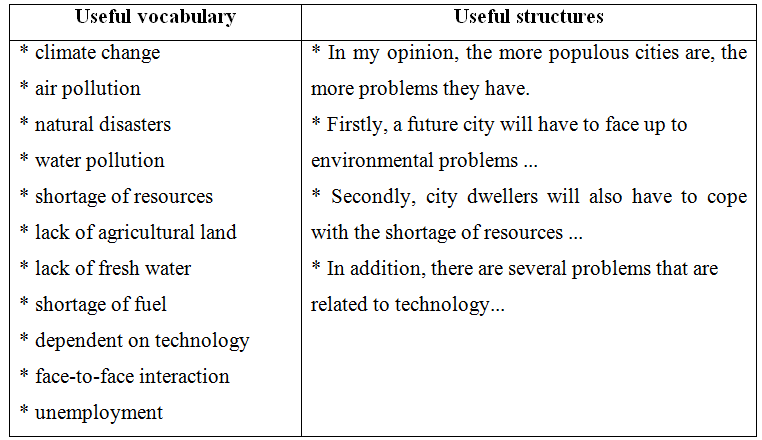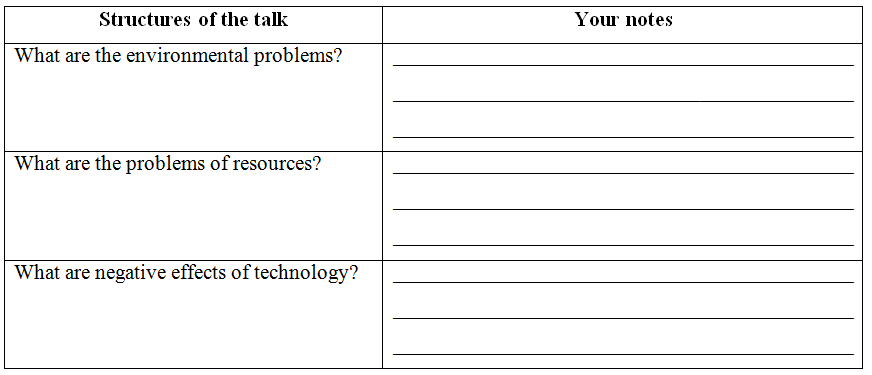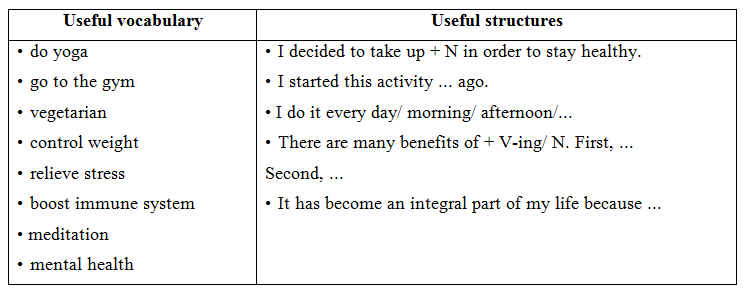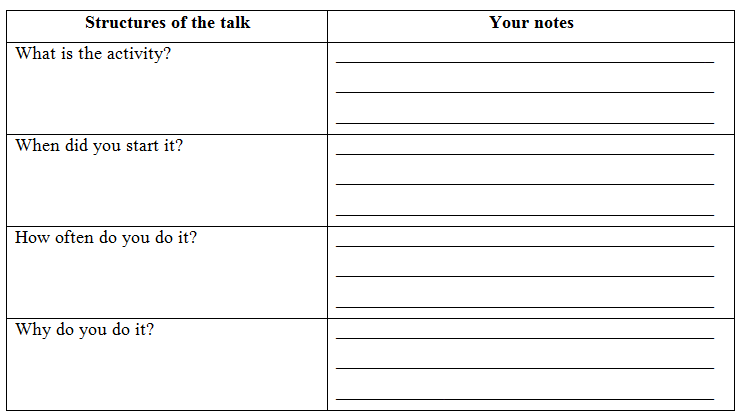Câu hỏi:
01/04/2024 57
Listen and fill in the blanks with ONE appropriate words.
1. The global population is predicted to reach___________billion in the future.
Listen and fill in the blanks with ONE appropriate words.
1. The global population is predicted to reach___________billion in the future.
Trả lời:
 Giải bởi Vietjack
Giải bởi Vietjack
Audio script:
What is the future of the cities? Global population is currently more than 7 billion and is predicted to top out around 10 billion. Most of the growth will occur in the urban areas of the world’s poorest countries. So, how will cities need to change to accommodate this growth? First, the world will need to seek ways to provide adequate food, sanitation and education for all the people. Second, growth will need to happen in a way that does not damage the land that provides US with the goods and services that support the human population. Food production might move to vertical farms and skyscrapers, rooftop gardens, or vacant lots in city centers while power will increasingly come from multiple sources of renewable energy.
Instead of single-family homes, more residences will be built vertically. We may see buildings that contain everything that people need for their daily life, as well as smaller, self-sufficient cities focused on local and sustainable production. The future of cities is diverse, malleable and creative, no longer built around a single industry, but reflecting an increasingly connected and global world.Tương lai của các thành phố là gì? Dân số toàn cầu hiện đang có hơn 7 tỷ người và được dự đoán sẽ đạt đến khoảng 10 tỷ. Hầu hết sự tăng trưởng này sẽ xảy ra ở các khu vực đô thị của các nước nghèo nhất thế giới. Vậy các thành phố sẽ cần thay đổi như thế nào để phù hợp với sự tăng trưởng này? Đầu tiên, thế giới sẽ cần tìm cách cung cấp thực phẩm, vệ sinh và giáo dục đầy đủ cho tất cả mọi người. Thứ hai, tăng trưởng sẽ cần phải xảy ra theo cách không gây thiệt hại cho vùng đất cung cấp cho chúng ta hàng hóa và dịch vụ hỗ trợ người dân. Sản xuất thực phẩm có thể chuyển đến các trang trại thẳng đứng và các tòa nhà chọc trời, vườn trên sân thượng hoặc các khu đất trống trong trung tâm thành phố trong khi năng lượng phần lớn đến từ nhiều nguồn năng lượng tái tạo.
Thay vì nhà ở đơn lẻ, nhiều khu dân cư hơn sẽ được xây dựng theo chiều dọc. Chúng ta có thể thấy các tòa nhà chứa mọi thứ mà mọi người cần cho cuộc sống hàng ngày của họ, cũng như các thành phố nhỏ hơn, tự túc tập trung vào sản xuất địa phương bền vững. Tương lai của các thành phố rất đa dạng, dễ thay đổi và sáng tạo, không còn được xây dựng xung quanh một ngành công nghiệp duy nhất, mà phản ánh một thế giới ngày càng kết nối và toàn cầu hơn.
Đáp án: 10
Dịch nghĩa câu hỏi: Dân số toàn cầu được dự đoán sẽ đạt đến________tỷ trong tương lai.
Giải thích: Thông tin có ở câu: “Global population is currently more than 7 billion and is predicted to top out around 10 billion.”
CÂU HỎI HOT CÙNG CHỦ ĐỀ
Câu 1:
Talk about problems a city will have to face up to in the future.
You can use the following questions as cues:
• What are the environmental problems?
• What are the problems of resources?
• What are negative effects of technology?
Useful languages:

Complete the notes:

Now you try!
Give your answer using the following cues. You should speak for 1-2 minutes.
1. In my opinion, the more populous cities are, the more problems they have.
2. Firstly, a future city will have to face up to environmental problems ...
3. Secondly, city dwellers will also have to cope with the shortage of resources ...
4. In addition, there are several problems that are related to technology ...
Now you tick!
Did you ...
- answer all the questions in the task?
- give some details to each main point?
- speak slowly and fluently with only some hesitation?
- use vocabulary wide enough to talk about the topic?
- use various sentence structures (simple, compound, complex) accurately?
- pronounce correctly (vowels, consonants, stress, intonation)?
Let’s compare!
Finally, compare with the sample answer on page 190.
Talk about problems a city will have to face up to in the future.
You can use the following questions as cues:
• What are the environmental problems?
• What are the problems of resources?
• What are negative effects of technology?
Useful languages:

Complete the notes:

Now you try!
Give your answer using the following cues. You should speak for 1-2 minutes.
1. In my opinion, the more populous cities are, the more problems they have.
2. Firstly, a future city will have to face up to environmental problems ...
3. Secondly, city dwellers will also have to cope with the shortage of resources ...
4. In addition, there are several problems that are related to technology ...
Now you tick!
Did you ...
- answer all the questions in the task?
- give some details to each main point?
- speak slowly and fluently with only some hesitation?
- use vocabulary wide enough to talk about the topic?
- use various sentence structures (simple, compound, complex) accurately?
- pronounce correctly (vowels, consonants, stress, intonation)?
Let’s compare!
Finally, compare with the sample answer on page 190.
Câu 2:
4. In the future, cars equipped with on-board computers will be able to__________and avoid traffic jams automatically.
4. In the future, cars equipped with on-board computers will be able to__________and avoid traffic jams automatically.
Câu 4:
7. If you want to raise rents, you have to__________the housing first.
7. If you want to raise rents, you have to__________the housing first.
Câu 7:
9. A: We should eat more fruit every day.
B: Fruit is good for health, isn’t it? ________
9. A: We should eat more fruit every day.
B: Fruit is good for health, isn’t it? ________Câu 9:
- Write an essay (150 -180 words) about improvements we will see in the cities in the future.
You can use the following questions as cues:
* How will transportation change?
* How will buildings change?
* How will entertainment change?
__________________________________________________________________
__________________________________________________________________
__________________________________________________________________
__________________________________________________________________
__________________________________________________________________
__________________________________________________________________
__________________________________________________________________
__________________________________________________________________
- Write an essay (150 -180 words) about improvements we will see in the cities in the future.
You can use the following questions as cues:
* How will transportation change?
* How will buildings change?
* How will entertainment change?
__________________________________________________________________
__________________________________________________________________
__________________________________________________________________
__________________________________________________________________
__________________________________________________________________
__________________________________________________________________
__________________________________________________________________
__________________________________________________________________Câu 10:
Choose the best option to complete each of the following sentences.
1. Many types of__________energy such as wind and solar energy will never run out
1. Many types of__________energy such as wind and solar energy will never run out
Câu 11:
4. First change/ city/ future/ be/ change/ infrastructure.
→ ________________________________________________________
4. First change/ city/ future/ be/ change/ infrastructure.
→ ________________________________________________________
Câu 12:
10. A: My brother graduated from university with a good degree.
B: He graduated from Havard University, didn’t he? ________
10. A: My brother graduated from university with a good degree.
B: He graduated from Havard University, didn’t he? ________Câu 13:
6. A: It’s important for us to have a good command of English.
B: Yes, English is the most popular language in the world, isn’t it? ________
6. A: It’s important for us to have a good command of English.
B: Yes, English is the most popular language in the world, isn’t it? ________Câu 14:
8. Please help me move the table to the corner, won’t you? ________
Câu 15:
18. A: The government should do something to limit the number of cars on the road.
B: I agree with you. Fumes from cars cause air pollution, don’t they? ________
18. A: The government should do something to limit the number of cars on the road.
B: I agree with you. Fumes from cars cause air pollution, don’t they? ________



